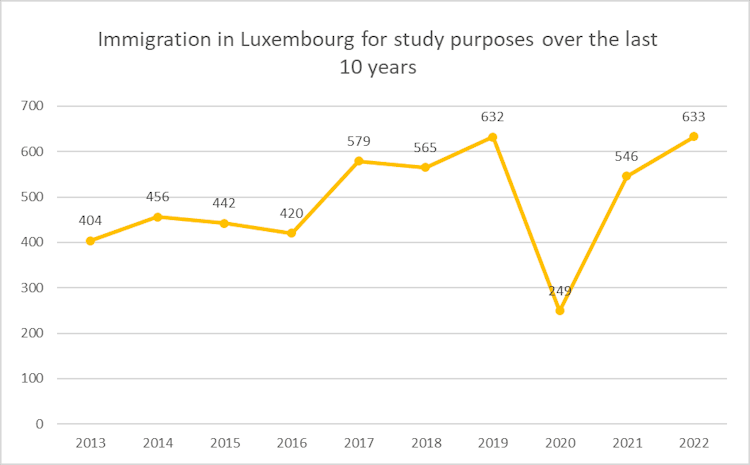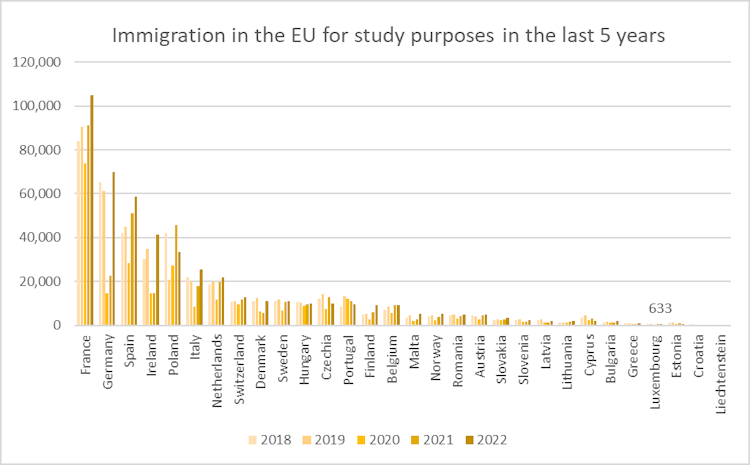
How to study in Luxembourg? Higher education in the country and ways to obtain it for foreigners
In this article, we will explore the ins and outs of studying in Luxembourg: why Luxembourg, where to find top-notch educational institutions, the step-by-step process of applying to universities, the cost of living, essential paperwork, and employment for students.
Embarking on a journey of higher education is a thrilling endeavor, and Luxembourg stands out as an exceptional destination for those seeking a unique academic experience. If you've ever wondered, how to study in Luxembourg, this article has you covered. Join us as we unravel the opportunities and nuances that make Luxembourg a captivating hub for academic pursuits.
Why Luxembourg?
Contemplating the prospect of studying in Luxembourg prompts a crucial question: why Luxembourg? What makes this small but thriving country an appealing choice for academic pursuits, and why should you consider it? Let's take a closer look at the compelling reasons that make Luxembourg an excellent destination for education.
The Grand Duchy has evolved into a prosperous financial center, boasting a robust economy and a high standard of living. Opting to study in Luxembourg means not just experiencing student life in this prosperous nation, but also unlocking opportunities for post-graduate living and working in one of Europe's highest-paying countries, with the world's highest per capita GDP.
While the cost of living in Luxembourg is relatively high, public university tuition fees remain reasonable. Notably, the University of Luxembourg, the sole public institution, charges a modest annual tuition ranging from 200 to 450 euros. This accessibility makes Luxembourg an attractive option for quality education without exorbitant expenses.
Luxembourg is renowned for its friendliness towards foreigners and its open cultural ethos. Given the country's multicultural context, you will be able to study in English as many programs are taught in this language, enhancing accessibility to study in Luxembourg for Indian students, and students from Nigeria, South Africa, and other countries. Studying here offers a unique opportunity to live and grow in a diverse environment that fosters global perspectives.
Beyond its economic strength and academic appeal, Luxembourg is a country brimming with history and attractions. During your leisure time, explore centuries-old landmarks such as Vianden Castle, Adolphe Bridge, the National Museum, Bourscheid Castle, Chemin de la Corniche, or Place Guillaume II. These sites, steeped in history, contribute to Luxembourg's rich tapestry, offering a unique blend of academic and cultural experiences.
How many people come to Luxembourg to study?
Examining recent statistics, in 2022, 633 individuals arrived in Luxembourg for study-related reasons, showcasing a consistent, albeit modest, growth trend over the past decade. It's worth noting that the year 2020 faced disruptions due to the COVID crisis, causing a temporary dip.
However, to gain a comprehensive perspective it's crucial to contextualize these figures within the European Union. Comparing Luxembourg to other EU nations, it ranks towards the lower end in terms of student immigration, attributed in part to its small size and relatively limited academic offerings compared to its larger counterparts.
This phenomenon can be attributed to Luxembourg's size, as it is a relatively small country with limited offerings in terms of academic institutions and study programs compared to its EU counterparts.
Additionally, Luxembourg's high standard of living, coupled with substantial living costs, presents a unique challenge for students. While the elevated living costs may not pose a significant hurdle for those employed in the country, thanks to the competitive salaries, students, reliant on family support or part-time jobs limited to a few hours a week, may find the cost of living a considerable constraint.
Read article
Where to study in Luxembourg?
You've decided to pursue studies in Luxembourg, but where exactly should you go? Let's unravel this question. Luxembourg hosts a singular public university, the University of Luxembourg, offering a diverse range of academic programs. However, the options extend beyond the public sphere, with several noteworthy private institutions.
Lunex University
Luxembourg School of Business (LSB)
MUDEC
BBI Luxembourg
European Institute of Public Administration (EIPA)
It's essential to note that private universities often come with higher tuition fees, ranging from 6,000 to 12,000 euros annually.
Read article
How to get admitted to a university in Luxembourg?
Now that you've identified your desired university and program, the next crucial step is understanding how to secure admission.
To tackle this, familiarize yourself with the specific requirements of both the university and your chosen program, ensuring you meet all criteria. While requirements may vary, certain universal strategies can enhance your chances of university acceptance.




How to apply to a university in Luxembourg: step-to-step instruction
Typically, the application process for universities to study in Luxembourg can be conducted online. Throughout this procedure, you'll be prompted to answer various questions and submit several documents. Ensure you gather the necessary documents for enrollment and have them translated into either English or the language of your intended studies, required at the university of your choice.
The most important documents will usually prove your motivation to the admission committee and answer the question "why should we accept you for the program?". Make sure you show your dedication, grades, achievements and any additional information, that can influence their decision.
The motivation letter is especially important; it gets a lot of attention when selecting a candidate. I probably spent a day writing it. First, I briefly talked about myself: who I am, what I have achieved, and why I need to be at the University. The most important thing in a motivation letter is to answer the question — why do you need the program, and how does it relate to your dream? One of my dreams is to start my own foundation. Therefore, the master's program is not the end. Foundations are a lifelong learning field. That is what my emphasis was built on.


While specific requirements may vary between schools and programs, generally, you'll need the following documents for your application
For European residents or nationals, concerns about residency papers are minimal. However, if you're not, securing a student residence permit in Luxembourg involves a series of procedures.
Before initiating the process, ensure you meet the key requirements: enrollment in a recognized educational institution and adequate financial means for sustenance. Once these prerequisites are in order, the process entails several steps before and after entering the country.
➤ Prepare the documents:
- A copy of the entire passport.
- Criminal record extract.
- Proof of full-time admission to a higher education institution in Luxembourg.
- Evidence of sufficient resources to cover stay and return expenses, with monthly resources at least 80% of the current minimum social inclusion income.
- Parental authorization for students under 18.
- Health insurance certificate covering health risks in Luxembourg (travel insurance).
- Proof of accommodation in Luxembourg.
➤ Apply for a temporary residence permit from the Directorate of Immigration at the Ministry of Foreign and European Affairs.
➤ Apply for a type D visa if you are subject to visa requirements (consult the Luxembourg government's list for relevant countries).
- Register your arrival at the commune of residence within 3 days of arrival.
- Undergo a medical check with the local medical authorities.
- Apply for a residence permit for students from third countries.
This is a general overview of the paperwork that must be done when coming to study in Luxembourg as a third-country national.
Read article
What is the cost of living for a student in Luxembourg?
Now that we have a clearer picture of the universities in Luxembourg and the application process, let's focus on one crucial aspect: the financial considerations. Even if you've found the right university and program, meeting all the requirements, covering your living expenses while studying becomes paramount.
In addition to the tuition fees, ranging from 200 to 450 euros per semester at the University of Luxembourg or 6,000 to 12,000 euros per year at private universities, living in Luxembourg as a student involves factoring in the following expenses.
Accommodation
Utilities
Groceries
Healthcare
Other expenses
In summary, monthly expenses in Luxembourg for students typically range from 750 to 2000 euros. Managing these costs effectively is crucial for a comfortable student life in this vibrant European destination. Plan wisely, considering accommodation options, lifestyle choices, and healthcare needs to ensure a financially sustainable and enriching academic experience in Luxembourg.
Is it possible to work as a student?
A common query among international students is the feasibility of employment while pursuing studies, especially considering the cost of living in Luxembourg. Fortunately, the student residence permit in Luxembourg offers the opportunity to work under specific conditions.


Read article
Frequently Asked Questions (FAQ)
Why should I choose Luxembourg for my studies
Luxembourg offers a thriving academic environment, a strong economy, and a high quality of life. Its multicultural setting and diverse programs make it an attractive destination for international students.
How many students come to Luxembourg for studies each year
What universities are available in Luxembourg
The University of Luxembourg is the primary public institution, complemented by several private institutions such as Lunex University, Luxembourg School of Business (LSB), Miami University Dolibois European Center (MUDEC), BBI Luxembourg, European Institute of Public Administration (EIPA) and others.
What is the cost of living for students in Luxembourg?
The monthly cost of living for students in Luxembourg ranges from 750 to 2000 euros. This includes accommodation (600-1200 euros for private apartments, 350-700 euros for university residences), utilities (100-250 euros), food and groceries (250-350 euros), health insurance (33 euros), and miscellaneous expenses (100-200 euros). Luxembourg's high living costs necessitate thoughtful financial planning to ensure a comfortable and sustainable student experience in this vibrant European destination.
Source: leverageedu.com, www.mastersportal.com, guichet.public.lu, luxembourg.public.lu, www.educations.com, ask-scholars.com, guichet.public.lu, www.studentum.fr
We took photos from these sources: Philippe Bout for Unsplash

